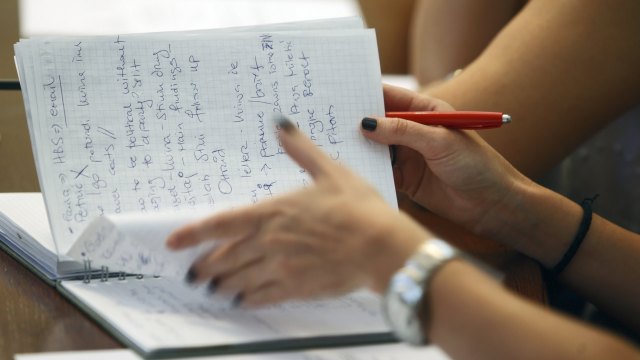Parents Need to Get Informed About Gadgets in Their Child’s Classroom

Too often when we hear a phrase like, “Parents trying to hold the local school accountable,” our minds assume that mom and dad are meddling in some way. Maybe they’re trying to get a book banned or suing the school for something dumb. Maybe mom and dad are demanding answers as to why Little Johnny can’t read even though they’ve never in their lives read Little Johnny a book.
You know — that sort of thing.
Despite instances of the above, it’s important to remember that there are many contexts in which well-informed parents should serve as a robust system of checks-and-balances to make sure schools are making smart decisions and executing those decisions the right way. A perfect example, as illustrated by NPR‘s Anya Kamenetz, is the recent classroom influx of new forms of educational technology.
Educators and parents alike are finding it tricky to balance two important yet conflicting goals. First, to reduce kids’ screen time. Kamenetz references an astounding statistic — that kids aged 8-18 spend about seven and a half hours per day looking at a screen taking in only recreational media. That’s a concerning figure for many.
The second goal is to infuse education with technologies relevant to long-lasting success. Computer science, for example, is gaining in popularity as an elementary school subject. Many school districts are introducing initiatives that allow for smartphones and laptops to be used in class. The ostensible goal is for these tools to augment research efforts, their distracting tendencies notwithstanding.
So how can you ensure your kids get a strong technical education without overusing screen devices? That’s a million-dollar questions right there. Another important thing for parents to think about is whether the school district’s tech initiatives are in the best of interest of all parties with a stake in the game. Take for example Los Angeles Unified’s canceled plan to purchase an iPad for every student in the district, an initiative built upon a $1.3 billion deal so greasy the FBI came in to investigate.
Kamenetz’ piece is a basic user’s manual for parents to understand the tools, ideas, and lingo behind edu-tech. Think of it as a study guide for mom and dad to understand how to have an intelligent conversation about classroom technology. The phrase “intelligent conversation” can’t be stressed enough. The only thing potentially more dangerous than a shady, unchecked school initiative is a legion of uninformed parents spouting nonsensical arguments about topics they know nothing about.
For example, Kamenetz offers guidance for parents who hear their local school say something like, “We’re raising money so we can put a tablet in the hands of every kid.” To this, parents should ask questions like: “Where are you getting the curriculum?” and “How are you training teachers to use these devices effectively?” Parents should be able to ask whether this sort of curriculum has been successful in the past and how the school plans on evaluating the initiative once it begins.
Ask any teacher to list their top five least favorite things about the job and I guarantee a strong majority will mention lousy, uninformed parents. The corollary to that statement is that parents can also be a major asset to the education process given they put in the work necessary to be informed. It’s like democracy — it only works when everyone with something at stake acts as such.
Take a look at the full piece (linked below) for more examples of edu-tech study guide material. Then I recommend watching the videos below featuring two Big Think experts offering cogent arguments on the topic of tech in the classroom.
Read more at NPR.
Photo credit: Syda Productions / Shutterstock





